
Michael Laurence Nyman, CBE is an English composer of minimalist music, pianist, librettist and musicologist, known for numerous film scores, and his multi-platinum soundtrack album to Jane Campion's The Piano. He has written a number of operas, including The Man Who Mistook His Wife for a Hat; Letters, Riddles and Writs; Noises, Sounds & Sweet Airs; Facing Goya; Man and Boy: Dada; Love Counts; and Sparkie: Cage and Beyond. He has written six concerti, five string quartets, and many other chamber works, many for his Michael Nyman Band. He is also a performing pianist. Nyman prefers to write opera over other forms of music.

Drowning by Numbers is a 1988 British-Dutch film directed by Peter Greenaway. It won the award for Best Artistic Contribution at the Cannes Film Festival of 1988.
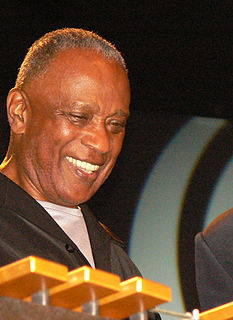
Robert Hutcherson was an American jazz vibraphone and marimba player. "Little B's Poem", from the 1966 Blue Note album Components, is one of his best-known compositions. Hutcherson influenced younger vibraphonists including Steve Nelson, Joe Locke, and Stefon Harris.
The Michael Nyman Band, formerly known as the Campiello Band, is a group formed as a street band for a 1976 production of Carlo Goldoni's 1756 play, Il Campiello directed by Bill Bryden at the Old Vic. The band did not wish to break up after the production ended, so its director, Michael Nyman, began composing music for the group to perform, beginning with "In Re Don Giovanni", written in 1977. Originally made up of old instruments such as rebecs, sackbuts and shawms alongside more modern instruments like the banjo and saxophone to produce as loud a sound as possible without amplification, it later switched to a fully amplified line-up of string quartet, double bass, clarinet, three saxophones, horn, trumpet, bass trombone, bass guitar, and piano. This line up has been variously altered and augmented for some works.

Live is a 1994 album by Michael Nyman and the Michael Nyman Band. It is Nyman's 24th release and the fifteenth with the Band. It is the first commercial live album by the band, which had previously performed live on the magazine release, 'The Masterwork' Award Winning Fish-Knife. It is also known as "The Upside-Down Violin", the only new composition on the album, and the working title, Breaking the Rules, made it into many computer sales systems. The album's cover and booklet were designed by Dave McKean. Liner notes are by David Toop. Early printings of the album cover listed the first three tracks erroneously as "Queen of the Night", "An Eye for Optical Theory", and "Chasing Sheep Is Best Left to Shepherds"

The Piano is the original soundtrack, on the Virgin Records label, of the 1993 Academy Award-winning film The Piano. The original score was composed by Michael Nyman and is his twentieth album release. Despite being called a "soundtrack", this is a partial score re-recording, as Nyman himself also performs the piano on the album. The music is performed by the Munich Philharmonic Orchestra conducted by Nyman with Michael Nyman Band members John Harle, David Roach and Andrew Findon performing the prominent saxophone work.

Neu! '72 Live! in Düsseldorf is the final entirely new album released to date by krautrock band Neu!.
Noises, Sounds & Sweet Airs is a 1991 opera by Michael Nyman that began as an opera-ballet titled La Princesse de Milan choreographed by Karine Saporta. The libretto is William Shakespeare's The Tempest, as abridged by the composer. The title is derived from Caliban's line, "This isle is full of noises, sounds, and sweet airs, which give delight and hurt not." It premiered in June 1991 in Hérouville-Saint-Clair, Calvados, France, with the L'Ensemble de Basse-Normandie conducted by Dominique Debart. Three members of Saporta's dance company provided the singing.

The Essential Michael Nyman Band is a studio album featuring a collection of music by Michael Nyman written for the films of Peter Greenaway and newly performed by the Michael Nyman Band. It is the seventeenth album release by Nyman. The album features liner notes by Annette Morreau, who describes the album as "a summation and digest of ten years of progress in the performance of music by a composer -- a composer with whom, so evidently, a group of friends and expert musicians intimately identify their total commitment, virtuosity, and joyous enthusiasm."
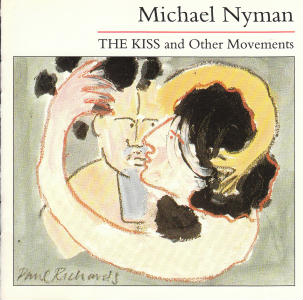
The Kiss and Other Movements is the sixth album release by Michael Nyman, and the fifth recording with the Michael Nyman Band. The title track is an "operatic duet" between Dagmar Krause and Omar Ebrahim, based on a painting of the same title by Paul Richards, which is depicted on the cover, and used in a video art project by Richards of the same name. The album includes music from Peter Greenaway's Making a Splash and 26 Bathrooms, an excerpt of Nyman's unfinished opera, Tristram Shandy, and a concert piece, "Tango Between the Lines".
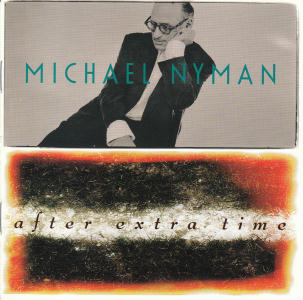
After Extra Time is a 1996 album by Michael Nyman with the Michael Nyman Band containing three tributes to Nyman's fandom of Association football: After Extra Time, the soundtrack to The Final Score, and Memorial. The latter is described as a remix, but is simply the 1992 recording from The Essential Michael Nyman Band. It was included in order to put it together with his two other football-inspired works. The album lists only three tracks, which has caused it to be erroneously reported that Memorial is track 3 and the others are all hidden tracks, but Memorial is track 26. Therefore, a track listing, as the individual portions of the pieces are not named, is not useful. The three pieces were recorded at separate times and thus have separate personnel lists.

Time Will Pronounce: The 1992 Commissions is a 1993 album by Michael Nyman, his eighteenth release. Nyman does not perform on the album, but he composed all the music, produced it, and wrote the liner notes. The album contains four compositions, each on a separate track. The album is dedicated to the memory of Tony Simons, "friend, manager, and generous and courageous survivor." The album is named for the second and longest of the four works, the only one featuring a former member of the Michael Nyman Band, Elisabeth Perry.
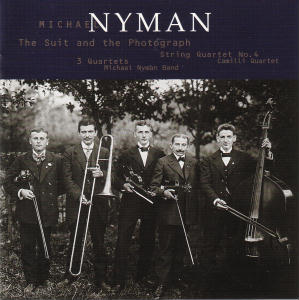
The Suit and the Photograph is a 1998 album by Michael Nyman with the Michael Nyman Band, recorded in 1995. On this album, Nyman is the composer, conductor, and producer, and wrote the liner notes. The album contains two works, String Quartet No. 4 and 3 Quartets. The album is named for its cover photograph by August Sander, which Nyman had associated with the Michael Nyman Band since its inception in 1977. He cites a description of the photograph by John Berger, in an essay of the same title, describing that the suits deform the working class rural men just enough to "undermine physical dignity." Both of the pieces on the album originated in Japan. It is Nyman's second release on EMI and his 33rd in general, but is not designated part of a series, as EMI had done with Concertos. Said Nyman of EMI, "I didn't excite them, and they didn't excite me." Nyman's only further releases on EMI would be the UK edition of Ravenous, featuring remixes by William Orbit, and The Actors, both film scores.
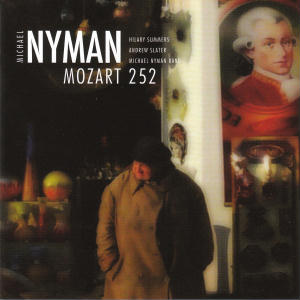
Mozart 252 is a 2008 album by Michael Nyman with the Michael Nyman Band, Hilary Summers, and Andrew Slater, celebrating the 250th anniversary of Wolfgang Amadeus Mozart's birth. Although "Revisiting the Don," one of only two newly written works on the album, was commissioned and performed in 2006, the album's title is a joke on its lateness as an album, released 252 years after Mozart's birth. The album also includes "In Re Don Giovanni," Nyman's first composition for the band, which is based on the first fifteen bars of "Madamina, il catalogo è questo" from Don Giovanni, six selections from Peter Greenaway's film, Drowning by Numbers, in which he was instructed to base the music on the slow movement of Mozart's Sinfonia Concertante K. 364, and two duets and an aria from Nyman's television opera, Letters, Riddles and Writs, in this recording featuring bass Andrew Slater as Leopold Mozart and contralto Hilary Summers as Wolfgang.
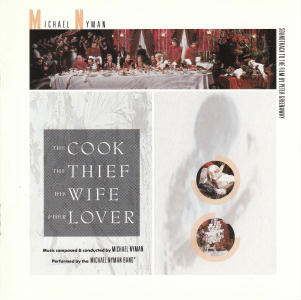
The Cook The Thief His Wife & Her Lover is the twelfth album release by Michael Nyman and the ninth to feature the Michael Nyman Band. It is the soundtrack to the eponymous film by Peter Greenaway. The album includes the first commercially released recording of Memorial, and this is the only piece discussed in the liner notes, to the point that the lyric sheet for "Miserere", the song which Pup the kitchen boy sings, is misidentified "Memorial." "Book Depository" is one of Nyman's many waltzes.
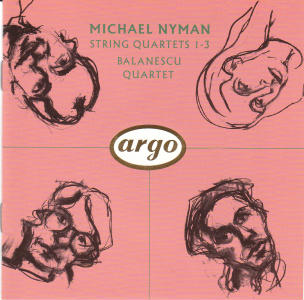
String Quartets 1–3 is a 1991 album by the Balanescu Quartet and the fifteenth release by Michael Nyman. It is the second album of his music on which he did not perform or conduct, though he does provide liner notes. String Quartet No. 3 is built out of Out of the Ruins and became a fixture in numerous Nyman film scores in the 1990s.

The Piano Concerto/MGV is the 23rd album by Michael Nyman, released in 1994. It contains two compositions, The Piano Concerto and MGV. The first is performed by Kathryn Stott and the Royal Liverpool Philharmonic Orchestra conducted by Michael Nyman, and the second is performed by the Michael Nyman Band and Orchestra with Michael Nyman at the piano.

Six Celan Songs • The Ballad of Kastriot Rexhepi is the 54th album released by Michael Nyman, who composed and conducted both the works on the album. The first, a setting of poetry by Paul Celan, was originally recorded by Ute Lemper and the Michael Nyman Band on The Michael Nyman Songbook in 1991, and here the band is joined by Hilary Summers. The Ballad of Kastriot Rexhepi is a new work created with the artist Mary Kelly. This is performed by the soprano Sarah Leonard with The Nyman Quartet: Gabrielle Lester, Catherine Thompson, Kate Musker and Tony Hinnigan.
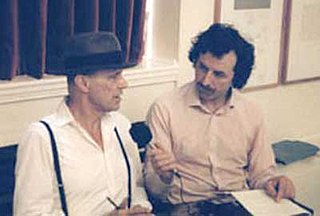
Audio Arts was a British sound magazine published on audio cassettes, documenting contemporary artistic activity via artist or curator interviews, sound performances or sound art by artists.

Metallic B.O. is a compilation album by American band the Long Ryders, released in 1989. It was assembled after the Long Ryders disbanded in 1987 by their fan club as an authorized C90 audio cassette release. It contains previously unreleased live recordings and studio outtakes, interspersed with snippets of radio dialogue and music between the actual tracks. The 89 minute tape was subsequently edited down to 75 minutes for CD reissue by Overground Records in 1990, and later by Prima Records in 2000.


















